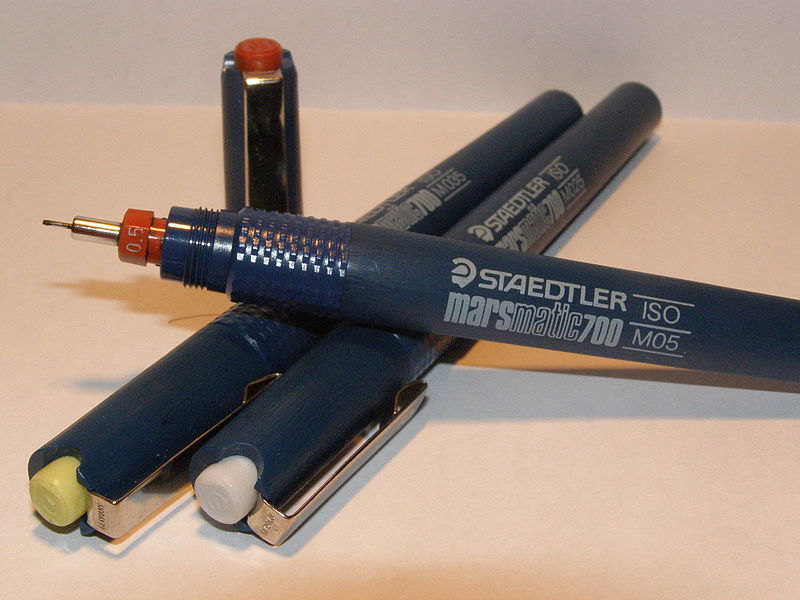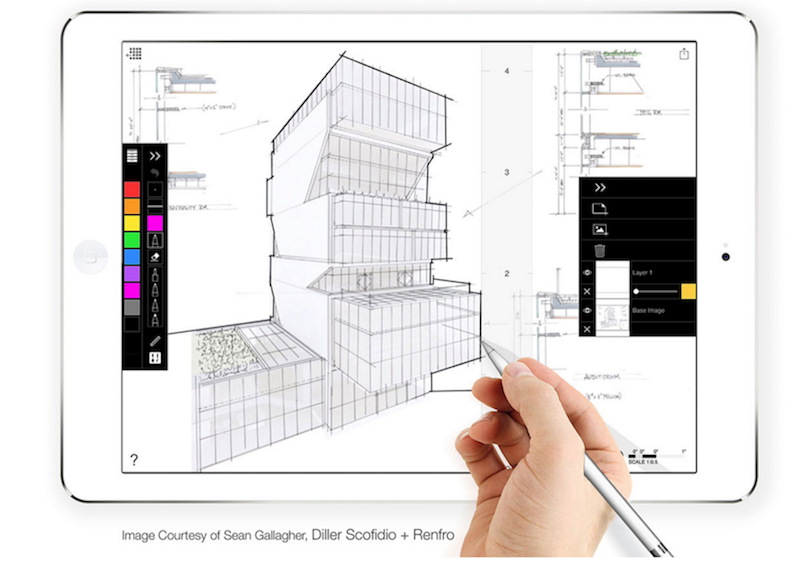They say it is a poor carpenter who blames his tools. But what if he isn’t blaming the tools, but praising them? That is the question Morpholio seems to have been asking itself when designing a technical pen for architects and designers in the modern age. A pen Morpholio hopes will be praised for making the lives of these architects and designers much easier.
As CAD software took over in the 90s and early 2000s, pen sets went the way of the dodo, and the art of hand drafting went along for the ride. But as architecturelab.net reports, a renaissance of architects using hand drawing and sketching as part of their process, thanks to the prevalence of touchscreens and styluses, is currently occurring.
And, as Anne Sullivan (known for being Helen Keller’s instructor) once said, “Every renaissance comes to the world with a cry, the cry to be free.” So, what are these designers and architects crying to be freed from? How about the one-size-fits-all sliders used for controlling line weight or the irksome task of constantly making note of the line weight being used for a given aspect of the drawing?
With the ability to zoom in and out of an image with a simple pinching or spreading motion of one’s fingers, a line that was perfect at one zoom level could become too thick when zoomed in our too thin when zoomed out.
That’s where Morpholio’s new ScalePen comes in. ScalePen works in tandem with Morpholio’s popular “Trace” drawing app and is described as Anna Kenoff, Morpholio Co-creator, as “an entirely new opportunity for architectural drawing.” The key feature associated with ScalePen is that it eliminates the need for the user to keep records of their pen weight. Instead, the software does the tedious pen-related bookkeeping itself.

Depending on the drawing scale and the zoom level, ScalePen continuously and automatically assigns a calibrated set of technical pens and pen sizes. Zoom in to a specific spot in the drawing and ScalePen will adjust. Zoom out or change the scale, and the pen sizes change too. The result of all of this dynamic change is that it saves time for the designer or architect and creates uniformity among line weight.
For example, a designer can zoom in on a site plan at 1/16-inch scale and draw specific details on one of their designs using a set of ten pen sizes. When finished, the designer can zoom out to, say, ¼-inch scale, and be gifted with a new set of ten pen sizes and add some additional details. Finally, the designer can zoom out to the original scale and be presented with the same ten pens they had at the start and continue on their merry way.
As Morpholio Co-creator Toru Hasegawa told architectmagazine.com, “No matter what zoom level you are in, there is a thinnest line and a thickest line relative to that zoom level.” Ah, the magic of the digital age.
The patent-pending ScalePen works with eight pen types, including pencil, charcoal, and brush, providing even more specificity and possibility for the designer/architect and making the tool even more useful. While it might still be unbecoming to blame the tools for any user-related shortcomings, Morpholio probably wouldn’t mind being praised for the opposite.
Related Stories
| Jan 6, 2014
Green Building Initiative names Jerry Yudelson as new President
The Green Building Initiative announced today that it has named Jerry Yudelson as its president to accelerate growth of the non-profit and further leverage its green building assessment tools, including the highly recognized Green Globes rating system.
| Jan 6, 2014
An interview with Jerry Yudelson, President, The Green Building Initiative
Green building consultant Jerry Yudelson has been named President of the Green Building Initiative and the Green Globes rating program. BD+C's Robert Cassidy talks with Yudelson about his appointment and the future of Green Globes.
| Jan 3, 2014
Norman Foster proposes elevated bikeways throughout London
Called SkyCycle, the plan calls for the construction of wide, car-free decks atop the city's existing railway corridors.
| Jan 3, 2014
World’s tallest vegetated façade to sprout in Sri Lanka [slideshow]
Set to open in late 2015, the 46-story Clearpoint Residences condo tower will feature planted terraces circling the entire structure.
| Dec 31, 2013
Top 10 blog posts from 2013
BD+C editors and our contributors posted hundreds of blogs in 2013. Here's a recap of the most popular topics. They include valuable lessons from one of the first BIM-related lawsuits and sage advice from AEC legend Arthur Gensler.
| Dec 31, 2013
BD+C's top 10 stories of 2013
The world's tallest twisting tower and the rise of augmented reality technology in construction were among the 10 most popular articles posted on Building Design+Construction's website, BDCnetwork.com.
| Dec 30, 2013
Calatrava facing legal action from his home town over crumbling cultural complex
Officials with the city of Valencia, Spain, are blaming Santiago Calatrava for the rapid deterioration of buildings within its City of Arts and Sciences complex.
| Dec 30, 2013
Survey: Number of licensed architects grows in 2012-13
A survey by NCARB shows that there are 105,847 registered architects in the U.S., up slightly from the organization's 2011-2012 survey.
| Dec 29, 2013
7 ways to make your firm more efficient
In a CEO.com post, Andrew Miller, president of ACM Consulting, shares the seven organizational efficiency strategies he encounters most frequently as he works with corporate executives to boost their performance.
| Dec 24, 2013
First Look: Calatrava's Sharq Crossing in Doha, Qatar [video]
The government of Qatar has released details of Sharq Crossing, a massive infrastructure project designed by Spanish architect Santiago Calatrava.

















